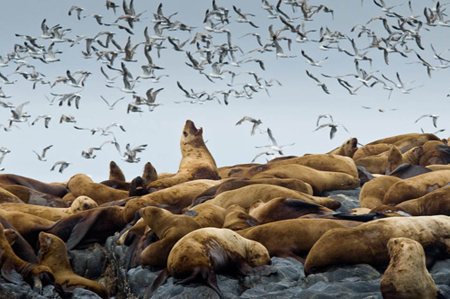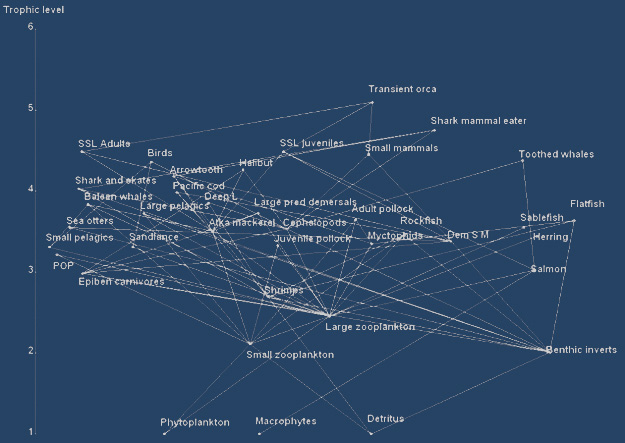
Ecopath was conceived by Dr. Polovina (NOAA) and advanced by Drs. Pauly, Christensen and Walters (UBC Fisheries Centre) — and has become the most widely used approach to analyzing and understanding marine ecosystems. It is considered to be one of the top ten breakthroughs in NOAA’s 200 years of history.
The strength of Ecopath lies in its ability to represent complex ecosystems using simple equations and limited data and computing power. Since being incorporated into a dynamic simulation model called Ecosim, it can also track ecosystem changes over time and space. It has revolutionized the understanding of complex marine ecosystems by allowing scientists to explore the ecosystem effects of fishing, environmental changes, and management policy options.
A conference celebrating and reviewing 25 years of progress using the Ecopath approach in fisheries management and ecosystem analysis will be held from August 30 to September 1, 2009 at the University of British Columbia (conference.ecopath.org). One of the keynote speakers will be Dr. Sheila Heymans of the Scottish Association for Marine Science who will talk about her use of Ecopath and Ecosim to conduct ecological network analysis, and how she used it to assess the ecosystem status of the Gulf of Alaska.
As Dr. Heymans will discuss, mapping an ecosystem’s trophic connections (i.e. food webs) is a complicated process that usually produces a jumble of data, which can overwhelm the most stoic researcher. “Ecological network analysis” is the process of teasing the most important information out of this mass, and finding patterns that might not be immediately obvious—such as which energy pathways are important to keep ecosystems functioning. Ecological Network Analysis was pioneered by Prof. Robert Ulanowicz from the University of Maryland.
Dr. Heymans and the UBC Fisheries Centre’s Sylvie Guenette and Villy Christensen used the Ecopath with Ecosim software to analyze two marine ecosystems in Alaska—the Aleutian Islands and Southeast Alaska and the effects that climate change and fishing have had on them. The ecosystems are currently in very different states due to differences in fishing and climate over the past 40 years. The researchers hoped that by using computer software to simulate the ecosystems over that time period, they might explain the different changes that occurred.

Figure 1: Food web of the Aleutian Islands with only > 10% of diet contributions shown.
Finding answers in indices
The research team studied a variety of complex indices—including, for example, the Finn cycling index, which quantifies the importance of cycles in ecosystems—in hopes that these would explain the dissimilar changes that occurred in the ecosystems over the past 40 years.
The researchers found that the Aleutian Islands ecosystem changed substantially after the 1977 regime shift (a large change in oceanic conditions that spreads throughout the food web), which resulted in a large decline in the main top predators (Steller sea lions, sharks, and skates). In contrast, the researchers found that the Southeast Alaska ecosystem did not change much at all until a similar shift in 1989-1990. The indices reflected differences between ecosystems.
A useful tool
Ecological network analysis is a new approach to understanding ecosystem dynamics that holds a great deal of potential. Not only does it allow researchers to extract the most important information from large, unruly masses of data, but it can also be useful for ecosystem managers, who can use indices to predict ecosystem changes before they occur.
Although it still involves large quantities of data and substantial computing power, ecological network analysis is gaining a reputation as a promising tool. With programs like Ecopath making the process easier, its popularity should continue to grow.
 PUBLICATIONS
PUBLICATIONS
|

|

 |
||||||||||||
